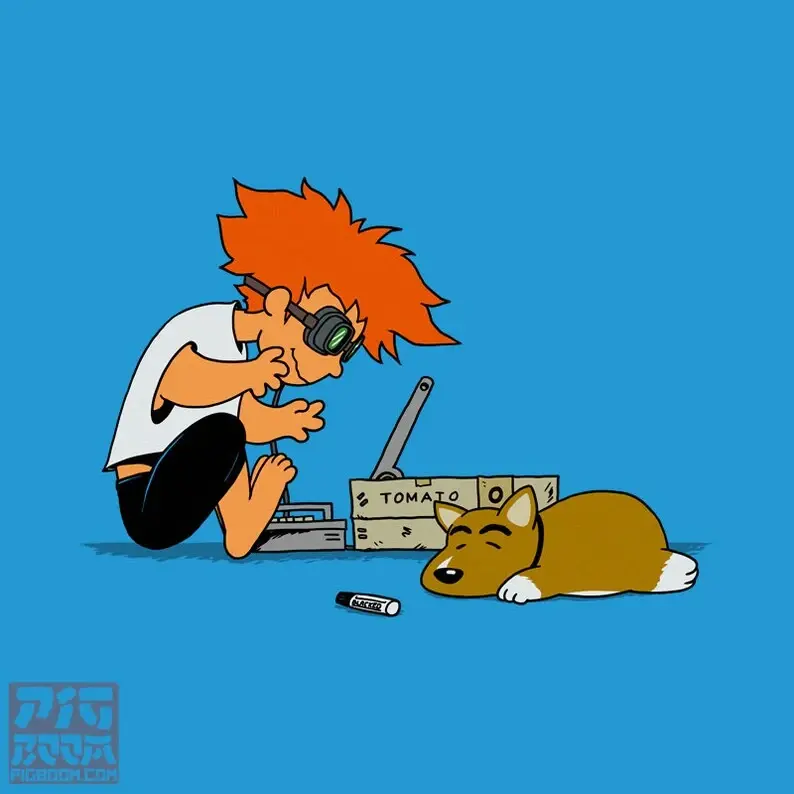i’m fine with this nor do i have a problem with systemd in genereal
I never understood the hate, tbh. A lot of users don’t even care if Sysd is used, as long as it works. So… Since the majority of distros use it… I think it works enough.
It seems to me to be mainly from people who are dedicated to the Unix philosophy that programs should do only one thing, and do it well. Tying everything up into systemd doesn’t follow that. I don’t care either, and I don’t mind systemd, but some people care about it enough to throw paragraphs of hate on it wherever it’s mentioned online. And apparently it’s “bloat”, and to some " bloat" is worse than the devil himself.
If you dig deeper into systemd, it’s not all that far off the Unix philosophy either. Some people seem to think the entirety of systemd runs as PID1, but it really only spawns and tracks processes. Most systemd components are separate processes that focus on their own thing, like journald and log management. It’s kinda nice that they all work very similarly, it makes for a nice clean integrated experience.
Because it all lives in one repo doesn’t mean it makes one big fat binary that runs as PID1 and does everything.
This is what turned me around: investigating and realizing that it is following the unix philosophy, it’s just under the hood (under the other hood inside the bigger under the hood).
I bet some of those people use neovim instead of the more unix philosophy ed.
My main issues are that it obfuscates things and seems to consume everything it can into itself.
Honestly, if it were more transparent and designed in a way to easily facilitate swapping out components with alternatives, I’d be a lot more okay with it.
I think some of the hate is from the main systemd dev, Poettering, being so abrasive on social media. He’s got a hateboner for certain distros (which don’t ship with systemd as the default).
I understand the concern about the future and we have seen overbloated projects have issues. In the long run though I will use what works best for me and only get into philosophical comparisons if im making the choice between relatively equal options.
The article talks about
sudoanddoasbeing SUID binaries and having a larger attack surface thanrun0would. Could someone ELI5 what this means?Basically, the SUID bit makes a program get the permissions of the owner when executed. If you set
/bin/bashas SUID, suddenly every bash shell would be a root shell, kind of. Processes on Linux have a real user ID, an effective user ID, and also a saved user ID that can be used to temporarily drop privileges and gain them back again later.So tools like
sudoanddoasuse this mechanism to temporarily become root, then run checks to make sure you’re allowed to use sudo, then run your command. But that process is still in your user’s session and process group, and you’re still its real user ID. If anything goes wrong between sudo being root and checking permissions, that can lead to a root shell when you weren’t supposed to, and you have a root exploit. Sudo is entirely responsible for cleaning the environment before launching the child process so that it’s safe.Run0/systemd-run acts more like an API client. The client, running as your user, asks systemd to create a process and give you its inputs and outputs, which then creates it on your behalf on a clean process tree completely separate from your user session’s process tree and group. The client never ever gets permissions, never has to check for the permissions, it’s systemd that does over D-Bus through PolKit which are both isolated and unprivileged services. So there’s no dangerous code running anywhere to exploit to gain privileges. And it makes run0 very non-special and boring in the process, it really does practically nothing. Want to make your own in Python? You can, safely and quite easily. Any app can easily integrate sudo functionnality fairly safely, and it’ll even trigger the DE’s elevated permission prompt, which is a separate process so you can grant sudo access to an app without it being able to know about your password.
Run0 takes care of interpreting what you want to do, D-Bus passes the message around, PolKit adds its stamp of approval to it, systemd takes care of spawning of the process and only the spawning of the process. Every bit does its job in isolation from the others so it’s hard to exploit.
Can someone ELI3?
(I’ll attempt this based on my understanding of both)
Pouring a cup of juice is something an adult needs to be involved with.
sudo is when you ask for permission to pour your own cup of juice. You ask an adult, they give you the cup and the juice, and then you’re responsible for pouring it. If the adult isn’t paying attention they may leave the fridge open for you to go back for more juice or another beverage, but otherwise you’re limited to the amount of juice the adult has given you.
run0 is when the adult just gets you a cup of juice. You tell them what you want, they go and pour the juice, and just give you the cup with the juice in it. You never enter the kitchen, so you don’t have access to the fridge, just your cup of juice.
This is an extremely good explanation.
Okay now please ELI1
Gagagoogoo Gagaga
when in need, cry out for mommy!
caseyweederman is not in the sudoers file. This incident will be reported.
Some executables are special. When you run them, they automagically run as root instead! But if sudo isn’t very, very careful, you can trick it into letting you run things as root that you shouldn’t be able to.
Run0 DM’s systemd asking it to go fork a process as root for you, and serves as the middleman between you and the other process.
You had me rolling, bud.
Dude, you need a prize for this comment. Very well explained!
Sounds good in theory.
But I’ve had so many issues with D-Bus fucking shit up on my systems that I’d be very reluctant to hinge my only way of recovering from failures upon something so brittle.
Granted, D-Bus hasn’t given me any trouble since moving to NixOS. The hell of trying to recover my arch systems from a perpetually failing D-Bus would make me very apprehensive to adopt this. I could see myself using run0 by default, but keeping sudo-rs or doas around with a much stricter configuration as a failsafe until the run0 + D-Bus + PolKit is absolutely stable and bulletproof.
I haven’t had D-Bus problems in quite a while but actually run0 should help with some of those issues. Like,
systemctl --userwill actually work when used with run0, or at least systemd-run can.Haven’t used it yet so it’s all theoretical, but it makes sense to me especially at work. I’ve used systemd-run to run processes in very precise contexts, it’s worth using even if just to smush together schedtool, numactl, nice, taskset and sudo in one command and one syntax. Anything a systemd unit can do, systemd-run and run0 can do as well.
I’m definitely going to keep
suaround just in case because I will break it the same I’ve broken sudo a few times, but I might give it a shot and see if it’s any good just for funsies.Just trying to explain what it does and what it can do as accurately as possible, because out of context “systemd adds sudo clone” people immediately jump to conclusions. It might not be the best idea in the end but it’s also worth exploring.
At that point just set a break-glass root password and don’t use sudo or doas.
Thank you, i didnt really understand what this was about ubtil now
Thanks a lot for this detailed, understandable and kind answer :)
Why not just fix sudo then?
Some people are opposed to
sudobeing a fairly complex program with an awkward to understand configuration language and a couple of methods that can fetch config from elsewhere. Fixing upstreamsudocan’t happen because those features exist and are presumably used by some subset of people, so straight up removing them is not good, but luckilydoasandsudo-rsexist as alternatives with a somewhat stripped featureset and less footguns.Others are opposed to the concept of SUID. Underneath all the SUID stuff lies far more complexity than is obvious at first sight. There’s a pretty decent chunk of code in glibc’s libdl that will treat all kinds of environment variables differently based on whether an executable is SUID, and when that goes wrong, it’s reported as a glibc bug (last year’s glibc CVE-2023-4911 was this). And that gets all the more weird when fancy Linux features like namespaces get involved.
Removing SUID requires an entirely different implementation and the service manager is the logical place for that. That’s not just Lennart’s idea; s6, as minimal and straight to the point as it tends to be, also implements
s6-sudo{,d,c}. It’s a bit more awkward to use but is a perfectly “Unix philosophy” style implementation of this very same idea.Or just use
doas, it’s still more secure than sudo
Never had an issue. Might look for a replacement should an issue arise. Been driving Linux since sarge.
SUID stands for Set User ID. An SUID binary is a file that is always run with the UID of the owner user (almost always root). Note that this does not require that the user running them has root permissions, the UID is always changed. For instance, the
pingcommand needs to set up network sockets, which requires root permissions, but is also often used by non-root users to check their network connections. Instead of having tosudo ping, any normal user is able to just runping, as it uses SUID to run as the root user.sudoanddoasalso require functions that necessitate them running as root, and so if you can find out how to exploit these commands to run some arbitrary code without having to authenticate (since authentication happens after the binary has started running), there is a potential for vulnerabilities. Specifically, there is the privilege escalation, which is one of the most severe types of vulnerabilities.run0starts usingsystemd-run, which does not use SUID. Instead, it runs with the permissions of the current user, and then authenticates to the root user after the binary has already started to run.systemd-runcontacts polkit for authentication, and if it succeeds, it creates a root PTY (pseudo-terminal/virtual terminal), and sends information between your session and the root PTY. So this means that in order to achieve privilege escalation withrun0as root, you have to actually authenticate first, removing the “before authentication” attack surface ofsudoanddoas.TL;DR SUID binaries will always run as the owner (usually root), even before any form of authentication.
run0will start with the permissions of the current user, and then authenticate before running anything with root permissions.Suid is a bit set on executables that results in them being run as the user that owns the file without needing a password, for example, passwd as root.
Run0 ignores this bit
What a nice succinct explanation!
But also completely useless. Run0 ignores the suid bit for the same reason as 99% of command line apps do: it ignores because it isn’t relevant to its functionality.
Yeah not sure what the big deal is honestly
Coming up:
systemd-antivirusdHear me out, breathes in, “Linux defender”
Linux Defender for Torvalds365
deleted by creator
Systemd is too egotistic to even mention Linux. They will simply name it
systemd-defenderd.Don’t believe me? See this!
deleted by creator
SystemD looks to replace Linux kernel with kern0
I’d just like to interject for a moment. What you’re referring to as Linux, is in fact, SystemD/Linux, or as I’ve recently taken to calling it, SystemD plus Linux. Linux is not an operating system unto itself, but rather another free component of a fully functioning SystemD system made useful by the SystemD corelibs, shell utilities and vital system components comprising a full OS as defined by POSIX.
Many computer users run a modified version of the SystemD system every day, without realizing it. Through a peculiar turn of events, the version of SystemD which is widely used today is often called Linux, and many of its users are not aware that it is basically the SystemD system, developed by the SystemD Project.
There really is a Linux, and these people are using it, but it is just a part of the system they use. Linux is the kernel: the program in the system that allocates the machine’s resources to the other programs that you run. The kernel is an essential part of an operating system, but useless by itself; it can only function in the context of a complete operating system. Linux is normally used in combination with the SystemD operating system: the whole system is basically SystemD with Linux added, or SystemD/Linux. All the so-called Linux distributions are really distributions of SystemD/Linux!
Brilliant!
So we’ll have to say GNU/Linux/SystemD soon?
Slackware users won’t! At least not so far.
Lol probably
Sounds reasonable. But I don’t like the
0in the name.Did they think about how far I would have to move my hand to type it? Sudo is only in two easy to reach places on the keyboard, run0 is 4 separate areas of the keyboard, one two rows from home and none on the home row.
I’m only partially joking.
This is fine, but why does everything need to be part of Systemd? Like, seriously, why can’t this just be an independent project? Why must everything be tied into this one knot of interdependent programs, and what’s going to happen to all of them when the people who are passionate about it and actually understand all the stupid ways they interrelate move on with their lives? Are we looking at the formation of the next Xorg? Will everybody being scrambling to undo all of this in another 20 years when we all realize it’s become an unmaintainable mess?
Systemd does a lot of things that could probably be separate projects, but run0 is an example of something that benefits from being a part of systemd. It ties directly into the existing service manager to spawn new processes.
Systemd does a lot of things that could probably be separate projects,
I dont get the hate for this - Linux is full of projects that do the same thing: coreutils, busybox, kde, gnome, different office suites, even the kernel itself. It is very common for different related projects to be maintained together under the same project/branding with various different levels of integration between them. But people really seem to only hate on systemd for this…
I guess for me the difference is that the kernel is just way beyond what I can understand and has never had any viable alternatives, gnome I really don’t like, and everything else you listed is just collections of simple stuff that aren’t actually very interdependent. Systemd is a giant mess of weirdly interdependent things that used to be simple things. Sure, some of them weren’t great, but every major distro abandoning all of the alternatives feels like putting all of our eggs in one basket that’s simultaneously getting more important and more fragile the bigger it gets.
Except desktop environments - they are far from a simple loosely collection of simple stuff. They coordinate your whole desktop experience. Apps need to talk to them a lot and often in ways specific to a single DE. Theming applications is done differently for every toolkit there is, startup applications (before systemd) is configured differently, global shortcuts are configured differently by each one… If anything it is something you interact with far more than systemd and has far more inconsistencies between each one. Yet few people complain about this as much as they complain about systemd.
Systemd is a giant mess of weirdly interdependent things that used to be simple things.
They used to be simple things back when hardware and the way we use computers were much simpler. Nowadays hardware and computers are much more dynamic and hotplugable and handle a lot more state that needs to persist and be kept track of. https://www.youtube.com/watch?v=o_AIw9bGogo is a great talk on the subject and talks about why systemd does what it does.
Systemd likes to break standards. That’s a big reason
What standards? The old init systems were a loose collection of shell scripts that were wildly different on every distro. Other tools like sudo also broke the established standards of the time, before it you had to login as root with the root password.
Even gnome and KDE have their own themeing standards as well as other ways of doing things. Even network manager is its own standard not following things that came before it. Then there are flatpack, snaps and app images. Not to mention deb vs rpm vs pacman vs nix package formats. Loads of things in Linux userland have broken or evolved the standards of oldern times.
Systemd breaks its own standards. Oh, were you making a replacement for this component of systemd that does some things the systemd version doesn’t? Well the latest version of systemd just changed the Unix socket protocol that it uses to communicate with the rest of systemd from text based to binary. Sorry for the lack of warning.
@AVincentInSpace @nous I’ve always disliked the arrogance of the lead Dev & the inexorable incremental usurping of Linux functionality. I’m deeply uncomfortable with so much being absorbed into a big binary black box
And fragmentation of projects is what caused the xz security incident.
Yeah, if all those complainers want something more modular, they’re free to push for protocols that allow to leverage existing components while also allowing for them to come from multiple vendors.
It seems a fairly explicit goal of systemd to redefine Linux as a unified platform rather than as a kernel that can run any one of many implementations of many different services. I assume this is not just the systemd lead but also a goal of Red Hat.
Personally, while I am ok with systemd defining itself as a single source for all this functionality, I hate that they are taking away ( or making it hard at least ) to have independent implementations of these services.
What Chinera is doing with dinit and turnstile is really interesting. It would be nice to have feature comparable approaches to the systemd monolith that distributions could choose from.
What Chinera is doing with dinit and turnstile is really interesting. It would be nice to have feature comparable approaches to the systemd monolith that distributions could choose from.
Link for other readers about Chimera Linux, dinit, turnstile : https://chimera-linux.org/development
I personally don’t have a problem with run0 over sudo, however, I don’t want to have to remember to use a different command on the terminal. Just rename it “sudo”, and do the new stuff with it. Just don’t bother me having to remember new commands.
You can uninstall the sudo application and add
sudoas an alias forrun0in your shell initialization script. That’s better than them renaming run0 to sudo, because that will prevent people from running the real sudo if they want it.You can create aliases
Me: Oh, I get it, this “Lemmy” website – it’s like The Onion but for nerds?
My fellow lemmings: No, they’re serious. run0 is real.
Me: Hah. The Onion, but for nerds! I love it.
Sounds good. It’s a win win. People that doesn’t like the system d implementation can use doas or keep sudo. I Hate the name though. Run0 is dumb can’t they just steal the name doas
I’ll just use an alias; sudo has been around for to long for me to change it and not be stressed about it.
Reminds me of when I aliased ‘man’ to ‘rtfm’
Sir, your thinking is certainly what kids call “next-level”.
Best alias confirmed
proceeds to add it to .bashrc and .zshrc
You guys know that there’s an actual rtfm app that condenses the output of man to human-readable stuff right? Right??
Wait, what?
Of course. . …I was wrong and it is tldr not rtfm.
https://github.com/tldr-pages/tldr
But surely you heard about TheFuck?
https://github.com/nvbn/thefuck
There’s actually an rtfm package in Arch’s aur, but it just opens the archwiki for you which just adds that tiny bit of… of That Arch Way Of Doing Things I guess.
I HAVE heard about thefuck!
Link to GitHub?
My bad: it’s tldr not rtfm
Me too I have
stupiddisputable aliases…Oh yeah I know about
tldr. It’s pretty great. I actually use a Rust version of it called teeldeer. I also have a whole lot of “disputable” aliases, for examplertfmfortldrandrtfmp(read the fucking man page) forman. I also usefuckingfor sudo. There’s nothing better than runningpacman -Syu, realizing the mistake and then typing infucking pacman -Syu
Well, since doas has a Linux implementation, stealing that name would cause lots of issues to users who already use it or want to use doas instead of run0. This will be a default part of systemd; not a new package. The reason it’s called run0 is because it’s just a symbolic link to systemd-run, and instead of executing as an SUID binary, like sudo or doas, it runs using the current user’s UID.
Will this be an integral part of systemd, or will they release it as a separate thing? I mean, if I like it, but I’m not using systemd (I do use it, but I’m just thinking about it), could I use this run0 (horrible name) without having to buy into all of systemd?
it’s just a link to systemd-run which is a part of systemd, i doubt it works separately.
but, if you use s6 as an alternative init system, s6-sudo is a somewhat equivalent aproach to how run0 works (instead of systemd-run it calls s6-ipcclient)
The article says it works by messaging systemd to run the process as the given user, rather than being a SUID binary. So it wouldn’t work without systemd.
Most systems ship with systemd
They were very specifically talking about ones that don’t.
Lol. Right after Microsoft added sudo to windows.
That wasn’t the “sudo”, MS just named something else “sudo”.
That’s rich, coming from a company that sued a child whose website domain name was mikerowesoft.com. (His name was Mike Rowe, and the site was about the software he made).
Anyway i prefer doas btw
sudo provides
sudoeditorsudo -ewhich allows me to use vim with my user configuration btwJust symlink your user config to root, nothing at all wrong with that.
Then the editor, all extensions, language servers, etc. are all running as root.
deleted by creator
Alias sudo=run0
Not-invented-here
Read the article.
It does something different and doesn’t ask to replace sudo everywhere. You brainless trashtalkers can’t even read an article before you judge.
I’m not systemd user, and I generally see this absorbing as much as possible as a terrible practice. I don’t usually comment on systemd stuff, since I’m happy just not being forced to use it.
However, even though I don’t use it, the decision of people managing systemd really affects non systemd users. See by succeeding in getting all major distros into become systemd distros (somehow now governed by RH, if anyone cares), everything systemd absorbs tend to leave alternatives sooner or later deprecated, or abandoned.
Even autofs is no longer part of some official repos, given systemd has its own auto mount/unmount functionality… And there are several other examples…
At any rate, hopefully the more bloated systemd, doesn’t make it the more vulnerable. And also hopefully, doesn’t make life worse and worse to non systemd distros and users…
BTW, before
sudothere wassu, so a life withoutsudois possible, :)
































